How To Dehydrate Cilantro
I want to show you today how to dehydrate Cilantro from the garden as you learn to preserve the fun items you may have grown yourself. I dehydrated some Cilantro about three years ago and I was hooked on it. Thankfully Cilantro grows like a weed! All you need is good soil and some awesome seeds and you are ready to plant. It sprouts here in my dry area of Utah in about two weeks, so don’t give up if you don’t see those little leaves start sprouting right away.
The only downside to growing your own Cilantro is once you clip it, your crop is done. In other words, you have to replant some more seeds. But, here’s the deal, you can grow so much that one crop can give you bunches of Cilantro to eat and preserve since a bunch of Cilantro tends to go a long way like many dried herbs. Drying fresh herbs can prove to be a fun activity for a family that grows and preserves their own food for storage and even long-term use.
Having some dried Cilantro can make a real difference when it comes to adding a unique flavor to many of your recipes as you add the dried Cilantro leaves or powder as directed. Another great feature of drying Cilantro is that it takes so little of your time.
I wrote this post back in 2016 and I feel an urgency to share a way for people to preserve their food from a garden, the store, or a Farmer’s Market. It’s critical to have food stored before you need it.
Options for Dehydrating
You don’t have to buy a fancy dehydrator unless you plan on dehydrating everything you can get your hands on like me. You can dehydrate / air-dry Cilantro in your car on the dashboard in direct sunlight on top of a clean window screen or cookie sheet. I wouldn’t dehydrate herbs or spice choices in my car since many put out a strong odor that may take weeks or months to go away. That’s my personal choice and I prefer a dehydrator. Air drying can be a cheap way to dry food, but be careful with spills since the dried food can crumble and go every which way.
Just giving you the heads-up here. Once when my daughters were really little we chopped onions to dehydrate in the house, yes you only do this once. We cut out sugar cookies for the Christmas tree to hang on the tree and didn’t realize those cute cookies would taste like onions. I called it a learning moment. The cookies looked fabulous but tasted like onions. Yikes! We dehydrated onions the next year outside on the patio.
Using Your Oven to Dehydrate
You can also dry foods in your oven. You need an oven with a low-temperature bake setting available, around 170 degrees is best. If yours won’t go that low, use the lowest setting, put your food on a baking tray or cookie sheet, and keep the oven door ajar using a wad of foil. Be sure to check on the food often to make sure the dehydrated foods don’t get too dry.
I love using my dehydrator because I don’t want a lot of food in the freezer to go bad in case we lose power. Once you start dehydrating you will use your dehydrator all the time. Please note, I don’t dehydrate my food for long-term storage. I leave that for the commercial processing companies. If you think about it if you have a bundle of bananas that are going to go bad, dehydrate them for healthy snacks. You can do the same with any fruit or vegetable. If you dehydrate vegetables they would have to be cooked with water to soften them prior to eating or you may chip your front tooth. LOL!
Can’t you just smell the Cilantro? When I cut it outside my hands and arms smell like it for days! Oh, how I love that smell. This is how it looks after it is dehydrated below.
How To Dehydrate Cilantro
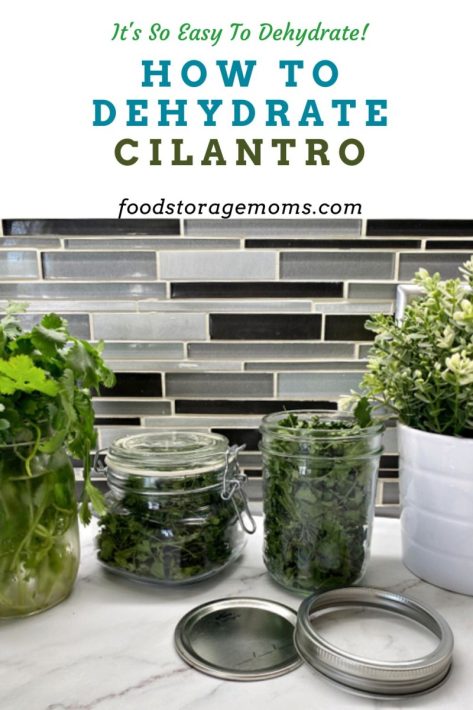
Step One: Turn on Dehydrator
I set my Excalibur Dehydrator at (115°F) = (46°C) degrees before I got started to prep the Cilantro.
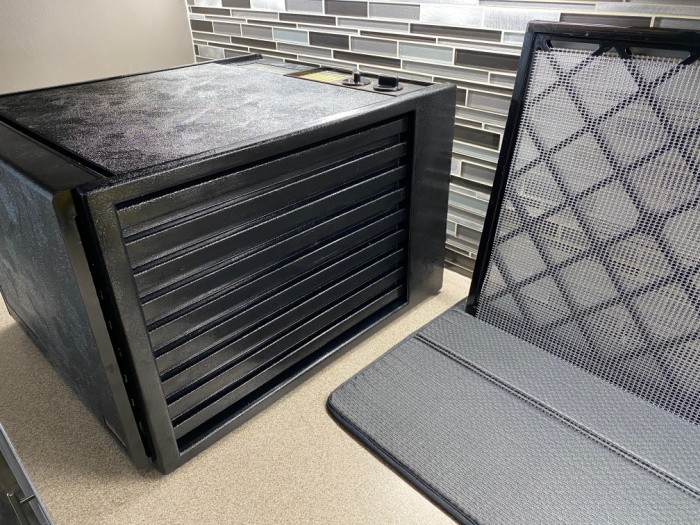
Step Two: Examine the Cilantro
Check the Cilantro and remove any damaged leaves or sprigs.
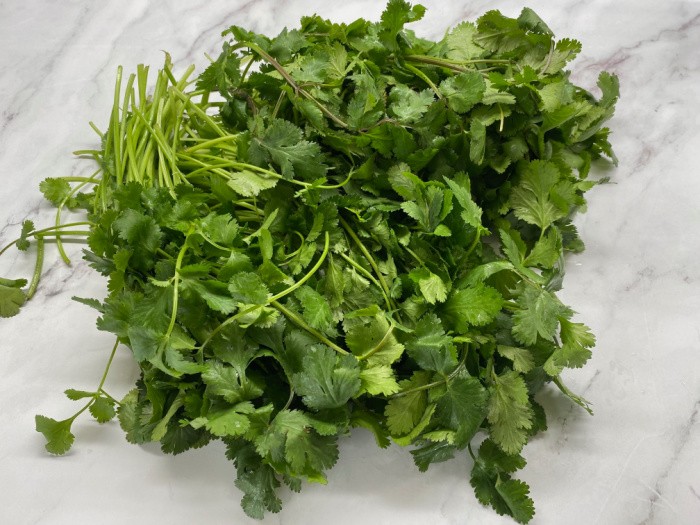
Step Three: Wash the Cilantro
Wash and drain the Cilantro. I use a salad spinner to make sure I get all the moisture off the leaves.
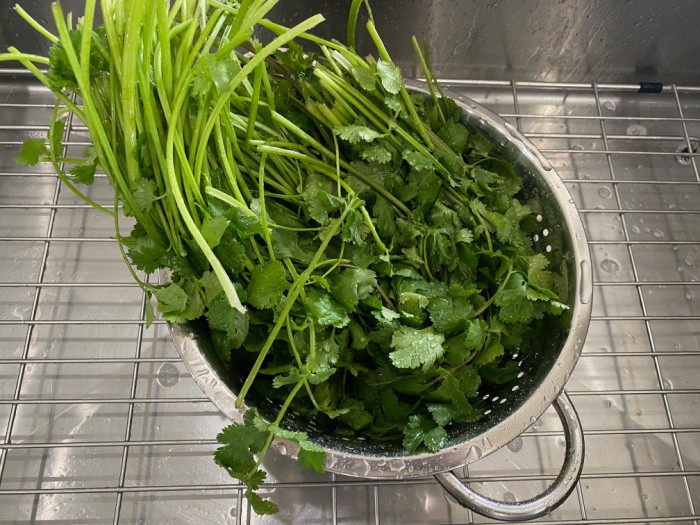
Step Four: Cut off Stems
Cut the stems off of the Cilantro and discard them, I prefer not to dehydrate the stems.
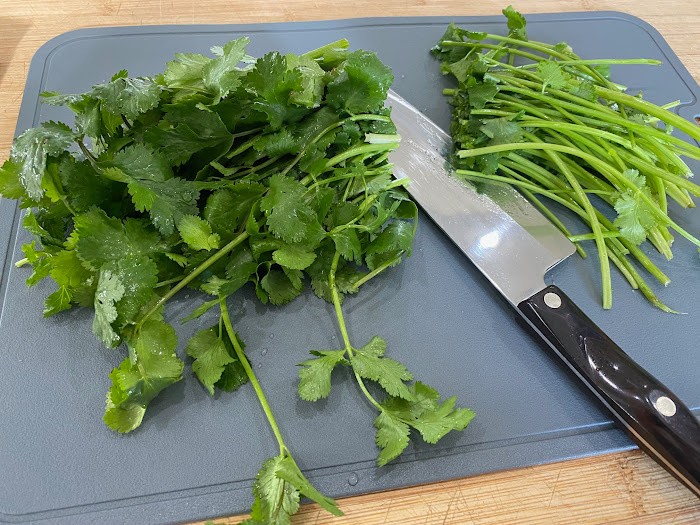
Step Five: Place the Cilantro on Dehydrator Trays or Racks
Place the Cilantro sprigs evenly on your dehydrator trays or racks. Try to make a single layer so the air gets around them more easily. This prompts the leaves to dry more quickly.
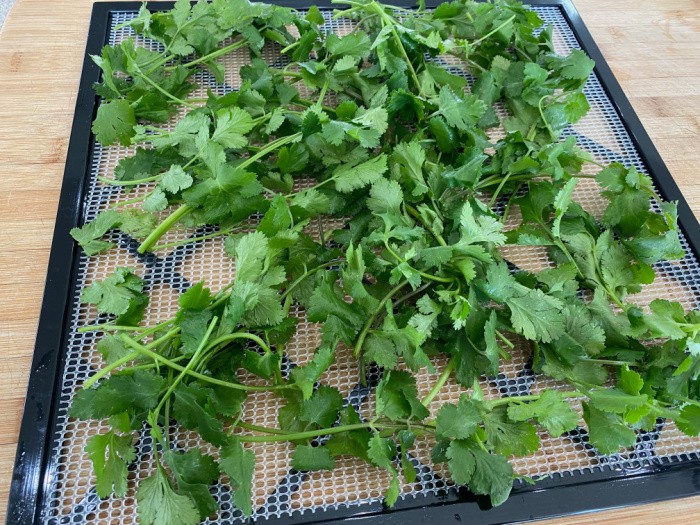
Step Six: Dehydrate until Completely Dry
It took two hours today to dehydrate my Cilantro. Please remember, it will always depend on the humidity in the area where you are dehydrating and the temperature setting used. Some dehydrator brands may suggest a different time and temperature setting than mine.
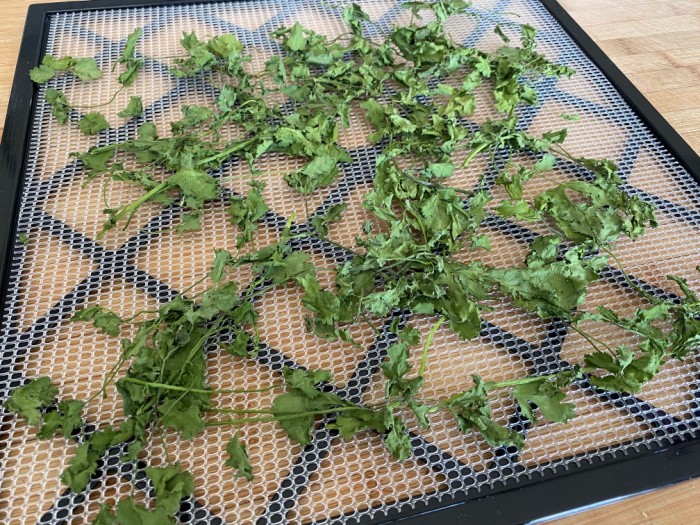
Step Seven: Condition Cilantro
If you live where it’s HUMID: “To condition the fruit, take the dried fruit that has cooled and pack it loosely in plastic or a glass mason jar. Seal the containers and let them stand for 7 to 10 days. The excess moisture in some pieces will be absorbed by the drier pieces. Shake the jars daily to separate the pieces and check the moisture condensation.” https://nchfp.uga.edu/how/dry/pack_store.html
I used to live in the DRY DESERT: I set my fruit and vegetables on my countertop for 5-7 days. Ten days are even better to make sure everything is dry before using your FoodSaver unit.
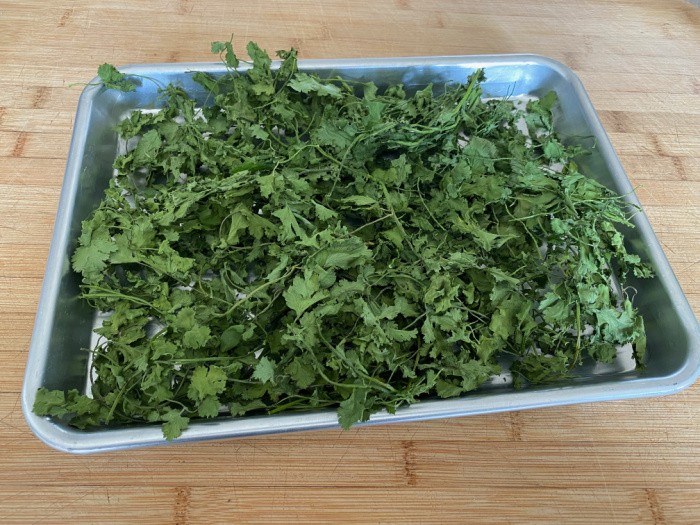
Step Eight: Place the Dried Cilantro in Glass Mason Jars
I placed the Cilantro in pint-size jars and used my FoodSaver to remove any air to prolong its storage life. Having airtight container jars makes a real difference in shelf life.

- 3-4 sprigs/sections fresh Cilantro
-
I set my Excalibur Dehydrator at (115°F) = (46°C) degrees before I got started to prep the Cilantro.
-
Check the Cilantro and remove any damaged leaves or sprigs.
-
Wash and drain the Cilantro.
-
Cut the stems off of the Cilantro and discard them, I prefer not to dehydrate them.
-
Place the Cilantro sprigs evenly on your dehydrator racks.
-
These took two hours today to dehydrate. Please remember it will always depend on the humidity in the area where you are dehydrating.
-
If you live where it’s HUMID: “To condition the fruit, take the dried fruit that has cooled and pack it loosely in plastic or glass jars. Seal the containers and let them stand for 7 to 10 days. The excess moisture in some pieces will be absorbed by the drier pieces. Shake the jars daily to separate the pieces and check the moisture condensation.” https://nchfp.uga.edu/how/dry/pack_store.html
I used to live in the DRY DESERT: As mentioned, I set my fruit and vegetables on my countertop for 5-7 days. Ten days is even better to make sure everything is dry before using your FoodSaver unit.
-
I placed the Cilantro in pint-size jars and used my FoodSaver to remove any air to prolong its storage life.
Preserve Cilantro by Freezing:
Another option for preservation is freezing Cilantro in bags. I freeze spinach and basil all the time. I wouldn’t keep it in the freezer over two months or so, but man is it good in freshly made buttermilk dressing. In Utah, we call it Ranch dressing. If you use the blender, just add a small handful of Cilantro into the mixture and it has a little kick to it. Most meal dishes you make like soups and stews, or even a garnish, are benefited by you adding a flavorful herb such as dill, oregano, or thyme, to name a few.
Here are the other Dehydrating Posts I have done:
- Dehydrating Apples
- Dehydrating Bananas
- Dehydrating Blackberries and Powder
- Dehydrating Blueberries and Powder
- Dehydrating Cilantro
- Dehydrating Cucumbers and Powder
- Dehydrating Ginger and Powder
- Dehydrating Grapes
- Dehydrating Green Onions and Powder
- Dehydrating Kale and Kale Powder
- Dehydrating Kiwi
- Dehydrating Lemons and Powder
- Dehydrating Marshmallows
- Dehydrating Peppermint Marshmallows and Powder
- Dehydrating Mushrooms and Mushroom Powder
- Dehydrating Onions and Powder
- How To Dehydrate Parsley and Powder
- Dehydrating Pears
- Dehydrating Pineapple
- Dehydrating Raspberries and Powder
- Dehydrating Spinach and Powder
- Dehydrating Strawberries
- Dehydrating Tomatoes and Powder
- Dehydrating Watermelon
Final Word
I hope you enjoyed my post today on how to dehydrate Cilantro. Here’s the deal, if you grow Cilantro you can dehydrate it and use it during the winter when you may not be able to garden. I put Cilantro stored in my pantry in salads, salsa on tacos, and with cooked rice. Just add it as you cook your meat, rice, or make salad dressing. Let me know how you use your Cilantro. It’s so good! May God Bless this world, Linda


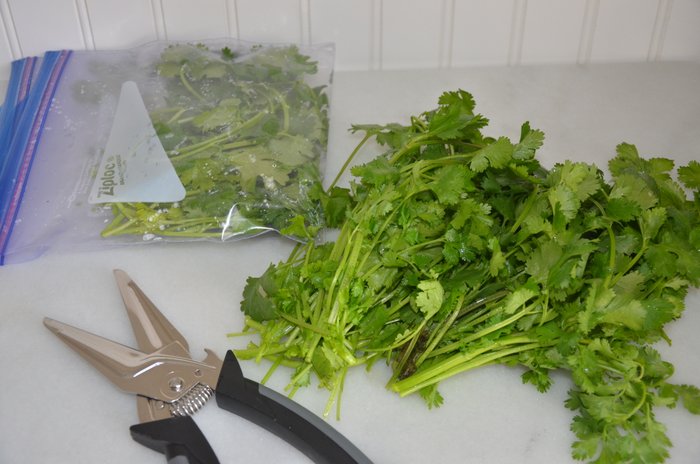
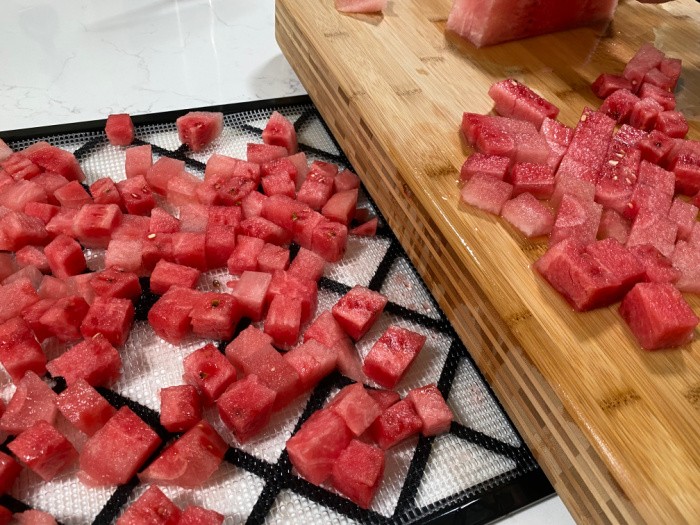
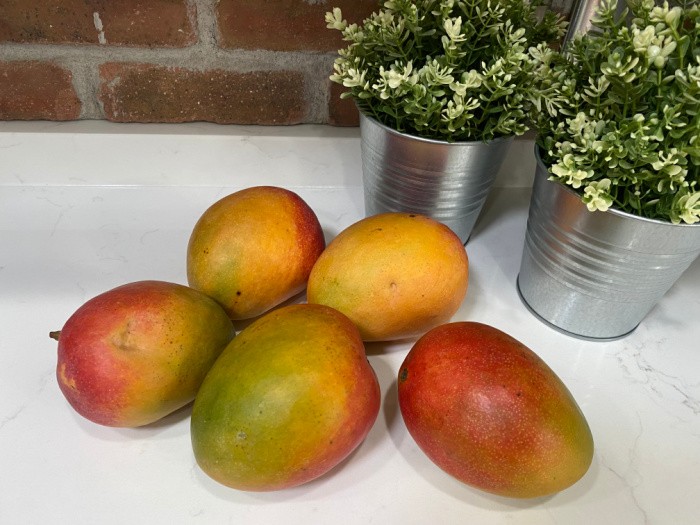
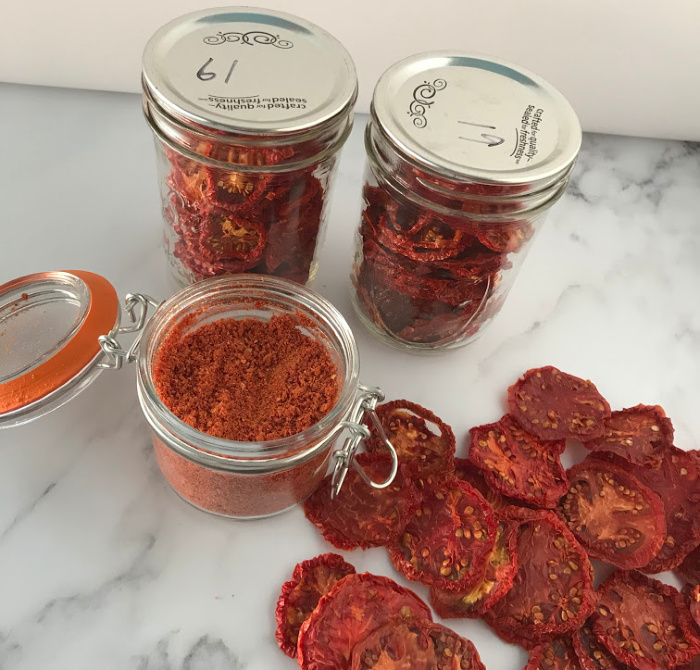
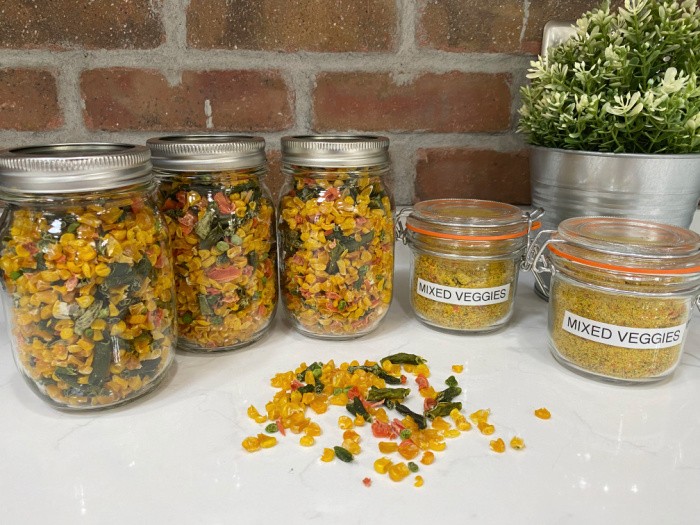
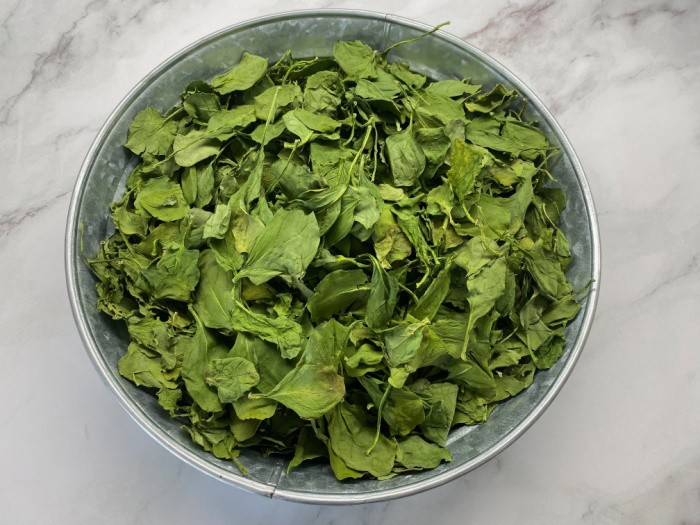
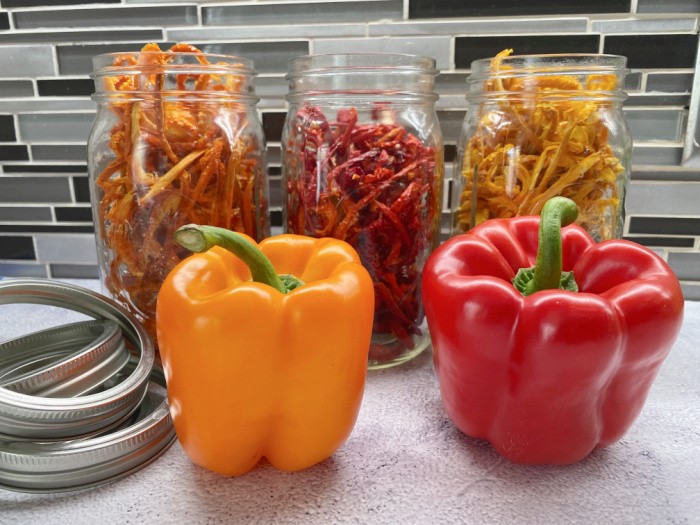













Linda: Love your articles. My problem is whenever I’ve dried celantro it turns out tasteless. I was wondering how the flavor of yours is? I really use a lot of celantro but freezing seems the only way to keep the flavor. Thanks Mary
Hi Mary, I’m so glad you love my articles! That melts my heart! I tried cilantro dehydrated and it is not as good as frozen cilantro. I did try freshly picked cilantro dehydrated that seemed better than the cilantro from the grocery stores. I think the flavor is a lot better frozen. I just had to compare the two so I could really see what gave us the best flavor. Hands down frozen is better. I was really hoping the dehydrated cilantro would give me the results I hoped for but frozen is still the best. Linda
First off I want to say superb blog! I had a quick question that I’d like to ask if you do
not mind. I was interested to know how you center yourself and clear
your thoughts prior to writing. I have had difficulty clearing my
mind in getting my thoughts out. I truly do take pleasure in writing
however it just seems like the first 10 to 15 minutes
are generally lost simply just trying to figure out how to begin. Any suggestions or tips?
Kudos!
Freezing is good but I prefer to chop onions and chop up cilantro and mix together and set aside and in a gallon ziplock bgs. I put 4 flat papertowels and lay it. In bg. Then i open the towels to put the mix in the middle of bg. And towels! Cover with towels and take air out and ziplock shut! It will stay fresh for 2 weeks in frig. Yes the towels will be moist later thats ok!
Hi Rita, thanks for this awesome tip! I love it! Linda
I love cilantro, but have never grown it. I never realized that once it was harvested, it was done. Thanks for the great info. I got some seed not too long ago and am going to start some in my indoor grow tent. Thanks to you, I now know to start more seed than just one or two plants!
I hope you fared well in yesterday’s/last night’s storms! It rained and hailed pretty heavy up here, on and off, for about 8 hours. Red Canyon was starting to flood in a few places when I went to work last night, but it was cleared up by the time I came home this morning. It hit you later than us, and from the look of the radar, pretty hard. Isn’t this crazy… monsoon starting up this late?
Hope all is well with you. Hugs, Mare
Hi Mare, the storm was crazy here too! I went over and slept with my sister’s dogs because they left for a few days and I knew the dogs would be shaking in fear from the thunder and lighting. I miss my two Shih Tzu’s so to go snuggle with her two dogs was a treat. You will be hooked on cilantro, plant it in stages and you will never run out of it. Hugs! Linda
I don’t even know how I ended up here, but Ithought this post was good.
I do not know who you are but certainly you’re going to a famous blogger if you
aren’t already 😉 Cheers!
Thank you for stopping by! Linda
Hey there I am so excited I found your site, I really found you by accident, while I was browsing on Yahoo
for something else, Regardless I am here now and
would just like to say cheers for a fantastic post and
a all round enjoyable blog (I also love the
theme/design), I don’t have time to go through it all at the minute
but I have bookmarked it and also added in your RSS
feeds, so when I have time I will be back to read a lot more, Please
do keep up the great b.
Hi Lizzie, thanks for stopping by and leaving some really kind words. Thank you, have a great day! Linda
Wow! This cilantro turned out great! Very flavorful! Love your blog
Hi Alli, thank you for the 5 stars, my sweet friend! It’s so nice to have Cilantro ready for any meal you are making! Linda
My family loves cilantro! I’ve always wondered what I should do with my extra cilantro. Dehydrating it would be perfect! Thank you so much for sharing!❤️
HI Camille, thank you for the 5 stars, my sweet friend! I love having Cilantro in my house whenever I need it! Linda
This was such a great post. I never thought of dehydrating cilantro! So fun and so helpful! Good too!
Hi Heidi, thank you for the 5 stars, my sweet friend! Having Cilantro whenever you need it is awesome! Linda
I love cilantro so I’m glad there is a way to extend its life in my cupboard! Thanks for the info!
HI Stacie, thank you for the 5 stars, my sweet friend! I love cilantro on so many dishes! Linda
I do cilantro and basil every year from my garden and store it in jars
Hi Matt, I love hearing this! It’s so awesome to have those jars ready to use at any time!! Love it! Linda
I’ve been dehydrating for years and one of the “rules” I learned in the beginning about drying herbs was: Hang soft herbs (herbs with soft stems not woody). Dehydrate (in a dehydrator or oven) hard herbs (woody stems like thyme, rosemary). What I have found over the years is that with the soft herbs, I retain a lot more flavor by hanging bunches upside down – I cut the herbs, bunch them, tie them together and hang them to dry.
Hi Leanne, I love these tips, I have hung some herbs upside down and in the dehydrator. I love to dehydrate a lot. I want to try potatoes as you mentioned. Linda